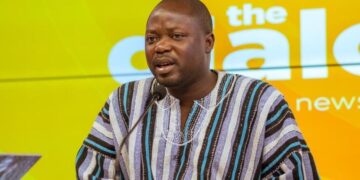Energy analyst Benjamin Nsiah has raised serious concern over what he describes as a longstanding lack of transparency in the management of Ghana’s Unified Petroleum Pricing Fund (UPPF).
In an interview on Epa Hoa Daben, Nsiah accused the National Petroleum Authority (NPA) of failing to declare the fund’s financial details to the public since its inception in 2005. He
stated that while the UPPF was introduced to ensure uniform petroleum prices across the country, the NPA has yet to publicly disclose how the resources in the fund have been utilized. “From 2005, they haven’t declared the fund’s resources to the public.” he said.
According to Nsiah, the people in southern Ghana, particularly Accra, end up paying more in margins to support the transportation of fuel to the northern parts of the country. He explained that as of the end of 2024, Accra alone had consumed approximately 4.9 billion litres of petrol and diesel a significant contribution to the national fuel demand.
“The UPPF margin is 90 pesewas per litre. These margins primarily serve as transportation costs — the fare charged on every litre of fuel moved from the storage facility to the final retail station,” Nsiah explained. “Once that transportation fee is deducted, the rest goes to the Metropolitan, Municipal and District Assemblies (MMDAs) for development projects.”
He added that about 70 percent of fuel products are consumed within Greater Accra, Ashanti, Western, and Central regions with the remaining 70 percent or less going to the Northern regions.
Nsiah believes this disproportionate consumption allows for some of the revenue generated from the south to be reallocated in support of fuel delivery to the north.”fuel is calculated in pesewas but multiplied in volumes” he added.
Despite the rationale behind the redistribution, Nsiah emphasized that the lack of transparency in how the UPPF is managed continues to raise questions among stakeholders and the general public. He is calling on the NPA to publish detailed reports on the fund’s inflows and outflows to ensure public accountability and trust.
Benjamin Nsiah, an executive director of the Centre for Environmental Management and Sustainable Energy (CEMSE), has been a vocal critic of how the UPPF is managed .
He argues that the current UPPF model is outdated and allows overcharging of consumers. For instance, he notes that the National Petroleum Authority (NPA) reportedly collects approximately 73 pesewas per litre for deliveries within a 66 km radius far above the actual cost of around 17 pesewas leading to over‑recovery and excess funds of about GHS 1.7 billion annually
[7:58 pm, 29/07/2025] Paulina: Ken Ohene Agyapong announces NPP 2028 Presidential Bid
Ken Ohene Agyapong has officially announced his intention to contest in the New Patriotic Party’s (NPP) 2028 Presidential Primaries, igniting excitement across Ghana’s political landscape.
Speaking during his announcement, Ken. Agyapong shared that his decision comes at a time when the call for visionary leadership and national cohesion is louder than ever.
“This is not just my journey, it is our collective mission,” he said, emphasizing a leadership approach rooted in integrity, inclusion, and opportunity for all. Supporters from diverse backgrounds, including young professionals, seasoned party members, and Members of Parliament, have shown resounding support, with many offering to personally sponsor his nomination.




















